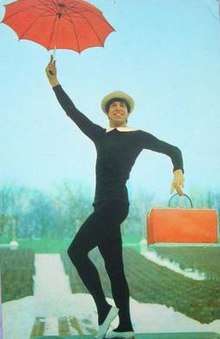Boris Amarantov
Boris Georgievich Amarantov (Russian: Бори́с Гео́ргиевич Амара́нтов; September 19, 1940 — March 3, 1987) was a Soviet variety actor, actor and director. He won many international competitions and festivals.
Boris Amarantov | |
|---|---|
Борис Амарантов | |
 | |
| Born | 19 September 1940 |
| Died | 3 March 1987 (aged 46) |
| Occupation | actor, director, mime |
| Years active | 1962–1987 |
Early life
He was born into the family of a dynastic priest.
On his sixth attempt, he enrolled at the State College of Circus and Variety Arts in Moscow. The young candidate was supported by a well-known clown-mime Leonid Yengibarov, a member of the selection committee.[1]
Career
In 1962 Boris graduated from the State College with the performance Ke-la-la (backing track Chella llà), which was staged by Sergei Kashtelyan. With this song he performed on the Little Blue Light and starred in the film Fair Wind, 'Blue Bird'!.[2]
In the same year Amarantov was awarded at the VIII World Festival of Youth and Students in Helsinki,[3] having made an impression his act Save the World (Nuclear Worker Failed) a warning of the threat from escalating the Cold War. The number was based on the combination and contrast of two pieces of music of the song "Top, Тop, Stomping the Вaby" by Tamara Miansarova and composition in rockabilly style called "I Want You to Be My Baby", performed by American singer Lillian Briggs.[4]
Soon Amarantov created his own theater of pantomime where the performance Miracles in Нis Вag was created, staged by Grigory Chukhray, Mark Donskoy and Amarantov. The play was a success.
Later Amarantov became a victim of the machinations of the Soviet bureaucratic machine: as a result of intrigues on the part of senior officials of the Ministry of Culture of the RSFSR, his theater closed repeatedly, and after its reestablishment, Amarantov himself was fired from it. After losing this job, he worked as a night watchman. In July 1975, he wrote a letter to the Supreme Soviet Presidium of a statement renouncing his Soviet citizenship and the requirement to give him the right to exit from the USSR to the West. He was refused in this request, was threatened and harassed.
In August 1977, he emigrated from the USSR and arrived in the United States in November. Contrary to his hopes, Amaranth's hopes of a career as an actor in the USA did not materialize. He moved to France, where he attended the school of mime Marcel Marceau and successfully worked in Marceau's troupe, and also successfully toured many countries of the world. He lived mainly in France.
Death
After returning to the USSR, at the beginning of perestroika and hoping to re-direct, Boris Amarantov died under mysterious circumstances on March 3, 1987. He was buried at the Vostryakovskoye Cemetery (129 section).[5]
Filmography
- Evening in Moscow (short, 1962) as juggler
- On Tomorrow's Street (1965) as mim Boris Amarantov
- Fair Wind, "Blue Bird"! (1967) as Lorimur
- Love for Three Oranges (TV, 1970) as Tartaglio
- The Big Attraction (1974) as mim
References
- Чтобы помнили. Борис Амарантов — Взлёт и падение
- Борис Амарантов с номером «Ке-ля-ля» в фильме «Попутного ветра, Синяя птица!» (видео)
- Амарантов — мим, жонглер, эксцентрик
- «Голубой огонёк» (1964) Борис Амарантов «Ке-ля-ля», «Берегите мир», реж. Сергей Каштелян (видео)
- "Могилы ушедших поэтов". Archived from the original on 2010-02-10. Retrieved 2016-10-23.
External links
- Boris Amarantov on IMDb
- Борис Амарантов на Радио «Свобода» (audio)
- Publications. Boris Amarantov. Performances, interview.